African-American Heritage in the Midwest |
This series of public talks and discussions among audience members concerning the heritage of African Americans in the Midwest is sponsored by the New Philadelphia Association, with the generous cooperation of Sprague's Kinderhook Lodge and the Illinois State Museum. |
This program is made possible in part by a grant from the Illinois Humanities Council, the National Endowment for the Humanities, and the Illinois General Assembly.  This series of public presentations and discussions includes the following seven events. |
 View of Buxton, Iowa, early 1900s. Undated archival photograph. |
Presented by Prof. David Gradwohl
Date and time: June 3, 2008, 7:00 pm
Location: Kinderhook Lodge, 22168 State Highway 106, Barry, Illinois 62312 (telephone 217-432-1090). Additional details and driving directions for the Kinderhook Lodge, which is located between the towns of Kinderhook and Barry on Rt. 106, are available on the internet at: http://www.kinderhooklodge.com.
Dr. David Gradwohl is Professor Emeritus of Anthropology at Iowa State University, and received his Ph.D. in anthropology from Harvard University in 1967. Among his numerous scholarly accomplishments and publications, Dr. Gradwohl directed a multi-year historical and archaeological research project concerning Buxton, Iowa, an African-American community that existed during the early 20th century, as detailed in his co-authored book Exploring Buried Buxton: Archaeology of an Abandoned Iowa Coal Town with a Large Black Population (1984). His presentation and discussion will address the history of changing perspectives of African-American history and insights from his long-term research concerning the social history of the many African Americans who worked and lived in the industrial town of Buxton.
Presented by Prof. Paul Shackel
Date and time: June 10, 2008, 7:00 pm
Location: Kinderhook Lodge, 22168 State Highway 106, Barry, Illinois.
Dr. Paul Shackel is Professor and Associate Chair of the Department of Anthropology at the University of Maryland-College Park, where he is also the Director of the Center for Heritage Resource Studies, a program that supports the comprehensive approach to the study of heritage. He received his Ph.D. from the State University of New York at Buffalo in 1987. Author of numerous books and articles, including Memory in Black and White: Race, Commemoration, and the Post-Bellum Landscape (2003), Dr. Shackel's work addresses what nationally significant sites mean to the American public, and how those heritage resources help to create and maintain concepts of national identity. His presentation and audience discussions will explore the ways in which civically engaged historical and archaeological research projects can play a role in illuminating controversial issues of our country's development, such as the impacts of social tensions concerning ethnicity, racism, and labor.
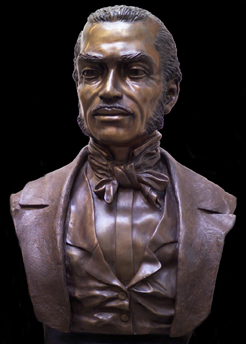 Frank McWorter, founder of New Philadelphia, Illinois. Sculpture by Shirley McWorter Moss on display at the Lincoln Presidential Library, Springfield. Photo courtesy of Sandra McWorter and Lincoln Pres. Library. |
Conditions of Subject and Object
Presented by Prof. Abdul Alkalimat
Date and time: June 17, 2008, 7:00 pm
Location: Kinderhook Lodge, 22168 State Highway 106, Barry, Illinois.
Dr. Abdul Alkalimat (Gerald McWorter) is Professor of African American Studies at the University of Illinois, Urbana-Champaign, and received his Ph.D. in sociology from the University of Chicago. He is a direct descendant of Frank McWorter. Among his numerous publications, Dr. Alkalimat was editor and chapter author of the influential text, Paradigms in Black Studies: Intellectual History, Cultural Meaning and Political Ideology (1990). His presentations will engage the audience in discussions about the history of African American communities and the impacts of racism in the 19th and 20th centuries from his perspective as a scholar in Black studies and as a descendant of the founder of New Philadelphia.
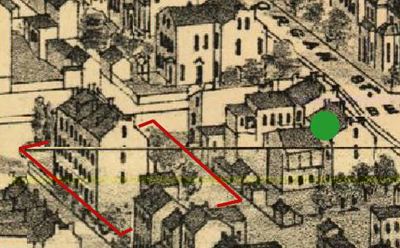 Bird's eye view drawing of Scott Joplin's neighborhood and house (green dot) in St. Louis in 1876. Image by Timothy Baumann with drawing from Compton and Dry 1876. |
in Nineteenth-Century Missouri
Presented by Prof. Timothy Baumann
Date and time: June 24, 2008, 7:00 pm
Location: Kinderhook Lodge, 22168 State Highway 106, Barry, Illinois.
Dr. Timothy Baumann is an Associate Professor of Anthropology at Missouri Valley College. He received a M. S. in anthropology at the University of Wisconsin-Milwaukee in 1995, and a Ph. D. in anthropology 2001 from the University of Tennessee-Knoxville. Dr. Baumann was the recipient of the Society for Historical Archaeology's John Cotter award in 2007, in recognition of his work in public outreach and African-American archaeology. He is a leading expert in historical and archaeological investigations of African-American heritage in the Midwest region. Dr. Baumann's presentation and discussions will address his archaeological and historical research concerning such aspects of African-American heritage, with a focus on his work at the Arrow Rock State Historic Site and the Scott Joplin State Historic Site in Missouri.
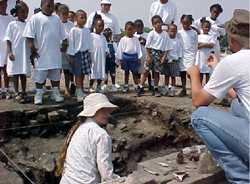 A group of Indianapolis students peer into a cellar excavation during 1991 field season. Photograph by Paul Mullins. |
Presented by Prof. Paul Mullins
Date and time: July 1, 2008, 7:00 pm
Location: Kinderhook Lodge, 22168 State Highway 106, Barry, Illinois.
Dr. Paul Mullins is an Associate Professor and Chair of the Department of Anthropology at the Indiana University-Purdue University Indianapolis. He received a M.A. in applied anthropology at the University of Maryland-College Park in 1990, and his Ph.D. in anthropology from the University of Massachusetts-Amherst in 1996. He is the author of Race and Affluence: An Archaeology of African America and Consumer Culture (1999), and he received the Society for Historical Archaeology's John L. Cotter Award in 2000 in recognition of his scholarship on African-American heritage and archaeology. His presentation will engage audience discussions concerning ways of analyzing the impacts of racism on American communities, with a focus on his long-term archaeological projects concerning past African-American communities in Indianapolis, Indiana.
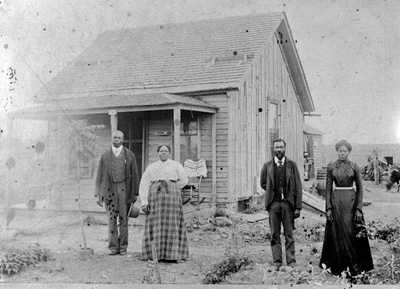 An early homestead in Nicodemus, Kansas, in 1860s. Library of Congress Photographic Collections. |
Presented by Prof. Flordeliz Bugarin
Date and time: July 16, 2008, 7:00 pm
Location: Illinois State Museum, 1011 East Ash Street, Springfield, Illinois.
Dr. Flordeliz Bugarin is an Assistant Professor in Anthropology at Howard University, and received her Ph.D. in Anthropology from the University of Florida. Her scholarship and research focus on the intersections of African-American history, African history, and archaeology. Dr. Bugarin is co-directing a multi-year historical and archaeological project concerning Nicodemus, Kansas, an African-American pioneering community on the western frontier during the 19th century. Her presentation and audience discussions will address the findings of a civically engaged archaeological project for exploring the social history of this past community, the contributions of African Americans to the shaping of the expanding frontier of the American west, and related questions of gender, class, ethnicity, and racism.
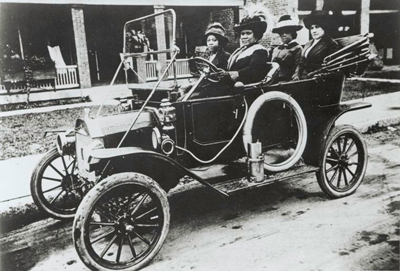 Madam C. J. Walker, designer and manager of most successful African-American cosmetics product line in the U.S. in early 1900s, examples of which have been recovered in archaeology in Indianapolis. Schomburg Center Photographic Collections. |
Presented by Prof. Kamau Kemayo
Date and time: July 23, 2008, 7:00 pm
Location: Illinois State Museum, 1011 East Ash Street, Springfield, Illinois.
Dr. Kamau Kemayo is Assistant Professor and Chair of the African American Studies Program at the University of Illinois at Springfield. He received a M.A. in Afro-American studies from the University of California, Los Angeles in 1986, and his Ph.D. in American studies from the St. Louis University in 1999. His numerous publications include Ancestral Communion in Contemporary African American Literature (2004) and his book entitled Emerging Afrikan Survivals: An Afrocentric Critical Theory (2003). Dr. Kemayo's presentation will guide audience discussions concerning the heritage of African-American literature and politics and past and present struggles against the elements of racism in American society.
The organizer and moderator for these events is Chris Fennell, an Assistant Professor of Anthropology at the University of Illinois, Urbana-Champaign. He is author of a book entitled Crossroads and Cosmologies: Diasporas and Ethnogenesis in the New World (University Press of Florida, 2007) and journal articles on archaeology, history, and African-American heritage, and is also editor and publisher of the African Diaspora Archaeology Network and Newsletter.
| New Phila. Association | Illinois State Museum | Archaeology Field School |